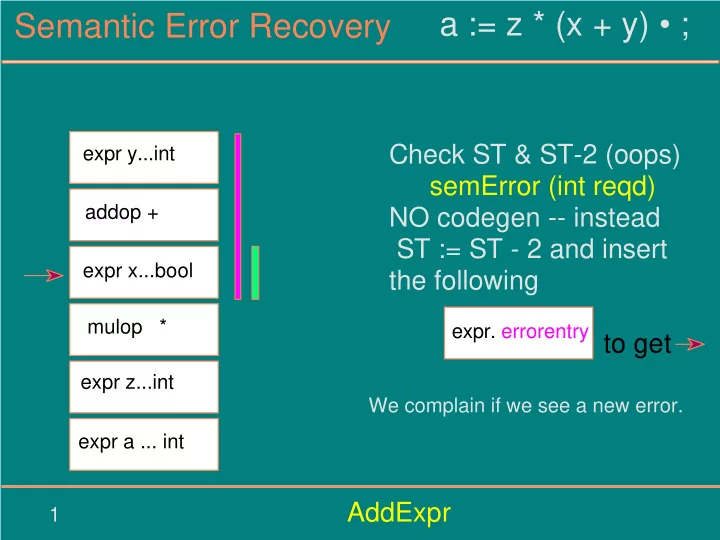

a := z * (x + y) • ; Semantic Error Recovery Check ST & ST-2 (oops) expr y...int semError (int reqd) addop + NO codegen -- instead ST := ST - 2 and insert expr x...bool the following expr. errorentry to get mulop * expr z...int We complain if we see a new error. expr a ... int AddExpr 1
a := z * (x + y) • ; Semantic Error Recovery Check ST & ST-2 (previous error) semError (int reqd) NO codegen -- instead ST := ST - 2 and insert expr. errorentry the following expr. errorentry to get mulop * expr z...int We don’t complain if we see an old error, but we propagate it if expr a ... int possible. MultExpr 2
a := z * (x + y) • ; Semantic Error Recovery Check ST & ST-1 (previous error) semError (int reqd) NO codegen -- instead ST := ST - 2 We don’t leave a special entry because the genStore protocol expr. errorentry doesn’t leave any entries at all. expr a ... int Assign 3
Semantic Error Recovery Rules: (a) Check for previous errors (special entry) if seen, tear down & propagate - silently (b) Check for current errors (illegal types...) if seen, tear down & propagate - complaining (c) Otherwise, do the right thing. Note: When tearing down, propagate any error to some remaining entry. If none remain the evidence of the error disappears from the run. 4
Semantic Error Recovery Notes: (a) Only one error message is issued. (b) All other action routines have a normal input protocol - except for the special entry. (c) Eventually the error entry disappears and you are back to normal processing. 5
Semantic Error Recovery Hint: 1. Build procedures to do this checking. Otherwise your logic will get convoluted. 2. Pass entry numbers to these procedures. 3. You can also build two layers (or more) of procedures: genAdd calls “okForArithmetic” which calls procedures at a lower layer. “okForArithmetic” can be reused in genMult, and the lower layer procedures can be used by several of the first layer procedures. 6
Recommend
More recommend